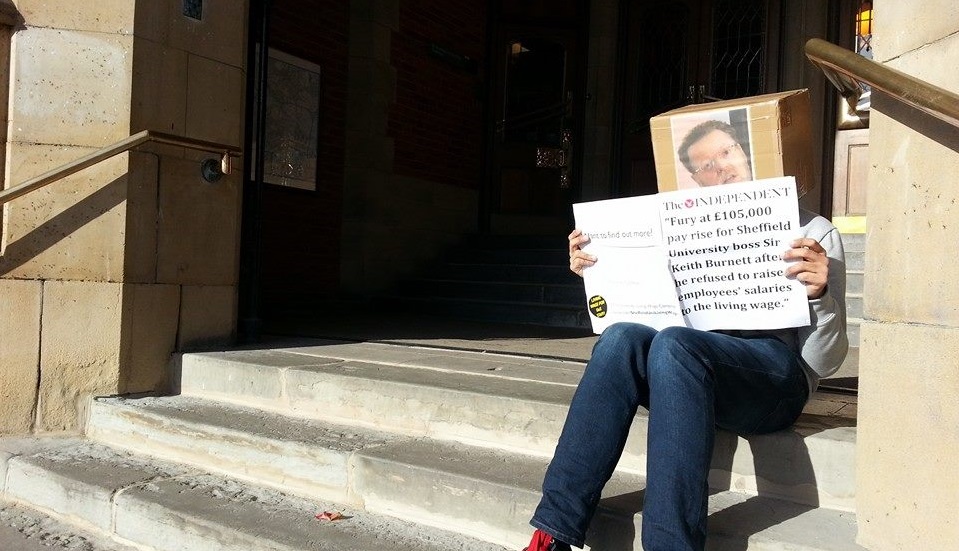Profits, pay days and protest: 7 Reasons University Pay Gaps Need to Be Tackled
by Josh Berlyne
19 January 2015

In the first few weeks of 2015, most university bosses will have earned the annual wage of their lowest-paid member of staff. Students across the country have been holding ‘pay day’ stunts to mark the date when their vice-chancellor (VC) passes this threshold, drawing attention to the dismal pay inequalities across higher education. Here Josh Berlyne from the Free University of Sheffield gives seven reasons university pay gaps have got no place in the future of HE.
1. Bosses’ rewards are getting bigger and badder.
Students aren’t too pleased about this, and this year they’re refusing to go unheard. Last week student activists at the University of Birmingham presented VC David Eastwood with a cheque to the tune of £410,000.
Warwick for Free Education went a step further, calling for VC Nigel Thrift’s knighthood to be rescinded. This got national press coverage – probably because Thrift’s knighthood for services to higher education came soon after he oversaw police pepper-spraying students and drawing a Taser at a peaceful sit-in in December.
2. These rewards come at the expense of students – we’re well aware of that.
In Sheffield, most students I speak to are furious about VC Keith Burnett’s pay packet. Last year, while staff fought tooth and nail just to stop their pay stagnating, Burnett received a £105,000 pay rise. My generation of students were the first to pay £9,000 fees, and where does that money go? Keith Burnett’s pay rise, so it seems.
3. Staff aren’t too pleased about the situation either.
If students are angry then staff are even angrier. A few months ago, I spoke to some cleaners about their work. We had to talk in a broom cupboard because nowhere else felt safe – but that’s not the worst of it. If they ask for more hours, they don’t get them. If they ask for fewer hours, they’re told that’s okay so long as they do the same amount of work. If they chat too much on their fag breaks, they have their wrists slapped like children. If they complain, the supervisor shuts them up and tells them they ought to be grateful.
I was told with no hint of irony that if “anybody’s that got a major problem with their health, you die at work.”
4. Being proud of our university doesn’t mean being happy with it.
These cleaners told me that they’re embarrassed by their wages. People assume that they’re paid well and treated well because they work for a university. Once upon a time that might have been true, but not anymore. While they’re proud to work for the university, they’re ashamed of their wages.
The university’s own staff survey says as much – 94% of staff are proud to work for the university, yet under two thirds are happy with their ‘total reward package’.
5. Management will sacrifice their integrity just for a good image.
The Human Resources department proudly wave their staff survey in the face of their detractors, chests puffed with pride. Ian Wright, associate director of HR, beamed when he told me that the vast majority of his staff were proud to work for the university. “But are they happy with their wage?” I asked. “Well, they’re proud to work for the university…”
Being proud and being happy are two different things. You might be proud that you work for an internationally-renowned university, but you’re probably not happy if you’ve been outsourced to a company wholly owned by that university, just so they can pay you less.
When I asked Wright about this, he told me that the university had set up a company called Unicus to meet student demands for more cafés. Management didn’t think it was “economically viable” to include the new workers in the existing pay structure, however. So in a nutshell, Unicus was created for cheaper labour? He laughed. “Don’t quote me on that…”
6. The quest for profit comes at the cost of co-operation.
Students aren’t fools. We’re well aware that the quest for profit is destroying higher education. When Nigel Thrift called upon the “spirit of co-operation” in his statement about the student protests, it left a bitter taste in the mouths of activists whose eyes were still burning and whose bruises were still throbbing.
@warwickuni well that’s some fucked up shitty statement justifying police violence.
— Tania El Khoury (@taniaelk) December 5, 2014
Thrift’s vice-chancellorship will be remembered for its spirit of coercion, the actions of West Midlands Police that day etched into our collective memory. Warwick students aren’t alone, however. The spirit of coercion has found its home in the Corporate University: it was there when security chained shut the doors of an occupation in Sheffield, and it was there when five Sussex students were suspended for peaceful protest in December 2013.
7. Democracy, fairness and honesty are the foundations of co-operation.
The dishonesty of Thrift and co. has no place in the future of higher education. The “spirit of co-operation” does not come with a get-out clause, it has no small print. An honest spirit of co-operation should define our universities. A good way to start would be a redistribution of wealth and power.
The spirit of co-operation means democratic control of our universities and a pay scale which fairly values the contributions made by workers. It means respect for staff and students alike, and it means listening to our opinions about the future of our universities. Muffling us with court proceedings, possession orders and injunctions will not make us go away. We will not be coerced, and we will not shut up. We might be young, but we’re not fools.
On Friday 30 January, the Free University of Sheffield is hosting a demonstration for free education outside the Students’ Union. You can keep up to date with the Free University of Sheffield on Facebook.
